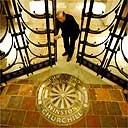One of Britain's most senior intelligence officers wanted the wartime leader, Winston Churchill, to threaten to drop atomic bombs on Nazi Germany a year before they were first used on Japan.
The scheme was seriously intended to be urged on the US president, Franklin Roosevelt, as a retaliation if V2 rockets were fired on British cities.
The call came from MI5's chief spycatcher, Guy Liddell, and revealed in his 12-volume private diaries, disclosed today by the public record office under the 60 year rule.
Liddell was admired for setting up the wartime double agent network which crucially deceived Hitler about the site of the D-Day landings in 1944. But the diaries also indicate that MI5, MI6 and the US wartime intelligence service were at times astonishingly ill-informed or prone to bluff and wild schemes.
Another scheme, reported by Liddell as under discussion with Roosevelt, was to attack Japan with inflammable bats.
An entry for December, 1943 says: "The bats ... would be put on board aircraft. Attached to [their] feet and wings would be small incendiaries.
"The bats were to be released from the planes near Tokyo - the idea being that they would fly down chimneys and all Tokyo would go up in flames."
The idea of a nuclear threat figures in an entry on August 22, 1944. It was in response to warnings from agents that Germany was about to start attacking London with V2s, the most dreaded weapon used against civilians in the war. Britain had known the V2 was under development since 1942.
Liddell wrote: "I told [TA Robertson, his head of double-agent activities] about the plan for threatening the Germans with the uranium bomb if they threatened to use the V2".
On August 25, he saw the MI5 head, Sir Stewart Menzies, about the issue: "I put to him the suggestion that it should be used as a threat of retaliation to the Germans if they used V2.
"[He] didn't think V2 use was imminent. However, [he said] there was nothing to lose and said he would put the suggestion to the PM, who might take it up on his visit to Roosevelt, which is due to take place early next month. On the other hand, he might decide to act more quickly."
In advocating a nuclear threat, Liddell and Menzies were either apparently urging a policy based on sheer bluff - or were unaware that work to develop a uranium-based bomb was nowhere near ready. Liddell believed it was far advanced. But the first test explosion was not carried out till nearly 11 months later, in Los Alamos, New Mexico.
Liddell won the Military Cross in the first world war. Joining Scotland Yard special branch in 1919, he was recruited to MI5 in 1927.
After his achievements in the second world war, he was expected to be made head of MI5 but was passed over. In 1953 he left to work for the atomic energy research establishment. He died in 1958, aged 66.

